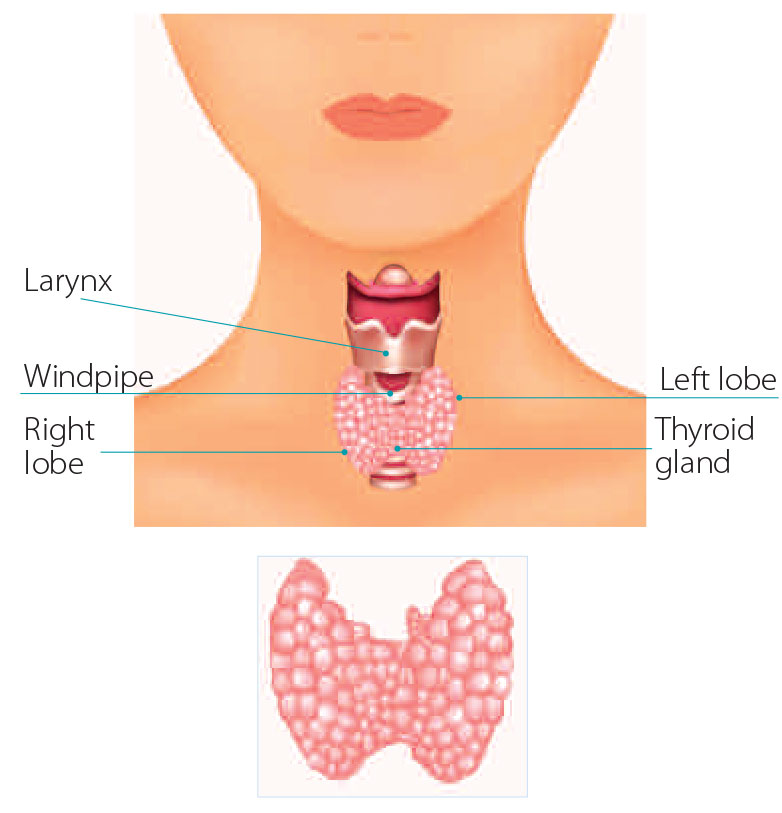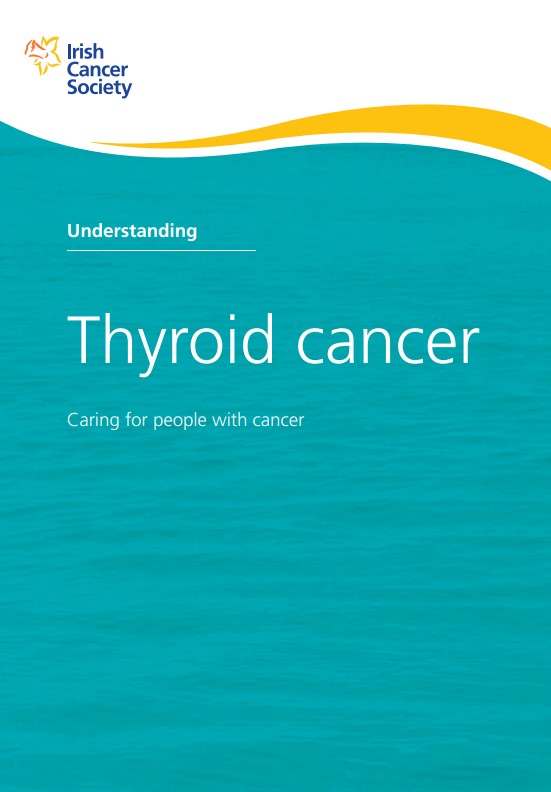Thyroid cancer
Thyroid cancer affects about 280 people in Ireland each year. It is more common in women and in people over 40.*
Signs and symptoms
Learn about the signs and symptoms of thyroid cancer. You are more likely to survive cancer if you find it at an earlier stage.
Treatments
There are a number of different treatments available for thyroid cancer. Your medical team will explain the best treatment options for you.
What is thyroid cancer?
Thyroid cancer happens when cells in your thyroid change and start to grow in an abnormal way. A group of these cancer cells can form a tumour. Thyroid cancer can affect how your thyroid works and cause symptoms.
About 280 people are diagnosed with thyroid cancer in Ireland every year.*
What are the types of thyroid cancer?
The most common type of thyroid cancer is called differentiated thyroid cancer (DTC).
There are two main types of DTC:
- Papillary thyroid cancer is the most common type of thyroid cancer accounting for about 4 out of 5 thyroid cancers diagnoses. It is more common in women aged 35 to 45. It is slow growing and has a high cure rate.
- Follicular thyroid cancer accounts for about 1 in 5 thyroid cancer diagnoses. It grows slowly and is usually found in older people.
Rarer types of thyroid cancer
Medullary thyroid cancer is a rare type of thyroid cancer.
There are two categories of medullary thyroid cancer: sporadic and hereditary. Sporadic accounts for the majority of medullary thyroid cancers.The inherited form has a genetic mutation that is carried in families.
If you have this type of cancer your family members are more at risk of getting it too, so talk to your GP about genetic testing and ways to spot cancer early. Read more about cancer and genetics.
Anaplastic thyroid cancer is also a rare cancer. Most people who get this cancer are older. It grows quickly and can be difficult to treat.
Papillary and follicular cancers have a lot of features in common so they are collectively known as differentiated thyroid cancers (DTCs).
What is the thyroid and what does it do?
Your thyroid is a gland at the base of your neck, just below your Adam's apple. It sits on top of your windpipe and below your voicebox (larynx).

It is shaped like a butterfly because the gland is in 2 halves. The halves are connected by a narrow bridge of thyroid tissue called the isthmus. The 2 halves are called the lobes of the thyroid. The thyroid is part of a network of glands that make up your endocrine system
What are thyroid hormones?
Your thyroid makes hormones that keep your heart rate, blood pressure, body temperature and weight at the right levels.
The thyroid gland releases 3 separate hormones:
- T3, which is known as triiodothyronine
- T4, which is known as thyroxine
- Calcitonin
The T3 and T4 hormones help regulate the body's metabolic rate. The metabolic rate is how fast the various processes of the body work, such as how quickly the body burns calories.
Excess levels of T3 and T4 in the body would make someone to feel overactive and cause them to lose weight.
Not enough T3 and T4 would make feel someone feel 'slow' and sluggish, and cause them to gain weight.
Calcitonin helps control the levels of calcium in your blood. Calcium is a mineral that has many important functions, such as building strong bones.
What increases my risk of thyroid cancer?
The cause of thyroid cancer is unknown. But there are certain things called risk factors that can increase your chance of developing the disease. These include:
Most cases occur in people over 40.
Women are more at risk than men.
These are not cancer but include an enlarged thyroid (goitre), thyroid nodules (adenomas) or an inflamed thyroid (thyroiditis).
If you have very little iodine in your diet, you are at risk.
If you have been exposed to radiation from a nuclear plant, you can develop thyroid cancer many years later.
If you had radiotherapy as a child, you may be more at risk in later life of developing thyroid cancer.
You are more at risk if a family member has had medullary thyroid cancer.
You may be at risk if you inherit faulty genes. For example, the RET gene may cause medullary thyroid cancer. Also, the bowel condition called familial adenomatous polyposis (FAP) may lead to thyroid cancer.
An overactive or underactive thyroid does not increase your risk of developing thyroid cancer.
Having a risk factor doesn’t mean you will get cancer. Sometimes people with no risk factors get the disease. If you’re worried, talk to your GP or talk to one of our cancer nurses. Call our Support Line on 1800 200 700 or visit a Daffodil Centre.
Reducing your risk of thyroid cancer
The most important thing you can do to reduce your risk of thyroid cancer is to:
- Get checked with your GP if you have a family history of medullary thyroid cancer.
Medical content updated from our 'Understanding thyroid cancer' booklet (2022), reviewed by Prof Marie Louise Healy, Consultant Endocrinologist; Prof Conrad Timon, Head and Neck Consultant Surgeon; Dr Sinead Brennan, Consultant Radiation Oncology; Una O’Connor, Medical Physicist; Cristina Domsa, Clinical Nurse Specialist Endocrinology; Colette Grant, Daffodil Centre Nurse.
Talk to a Cancer Nurse

Support Line
Our Daffodil Centres

*The Irish Cancer Society uses the most up-to-date cancer statistics from the National Cancer Registry Ireland, available on www.ncri.ie

